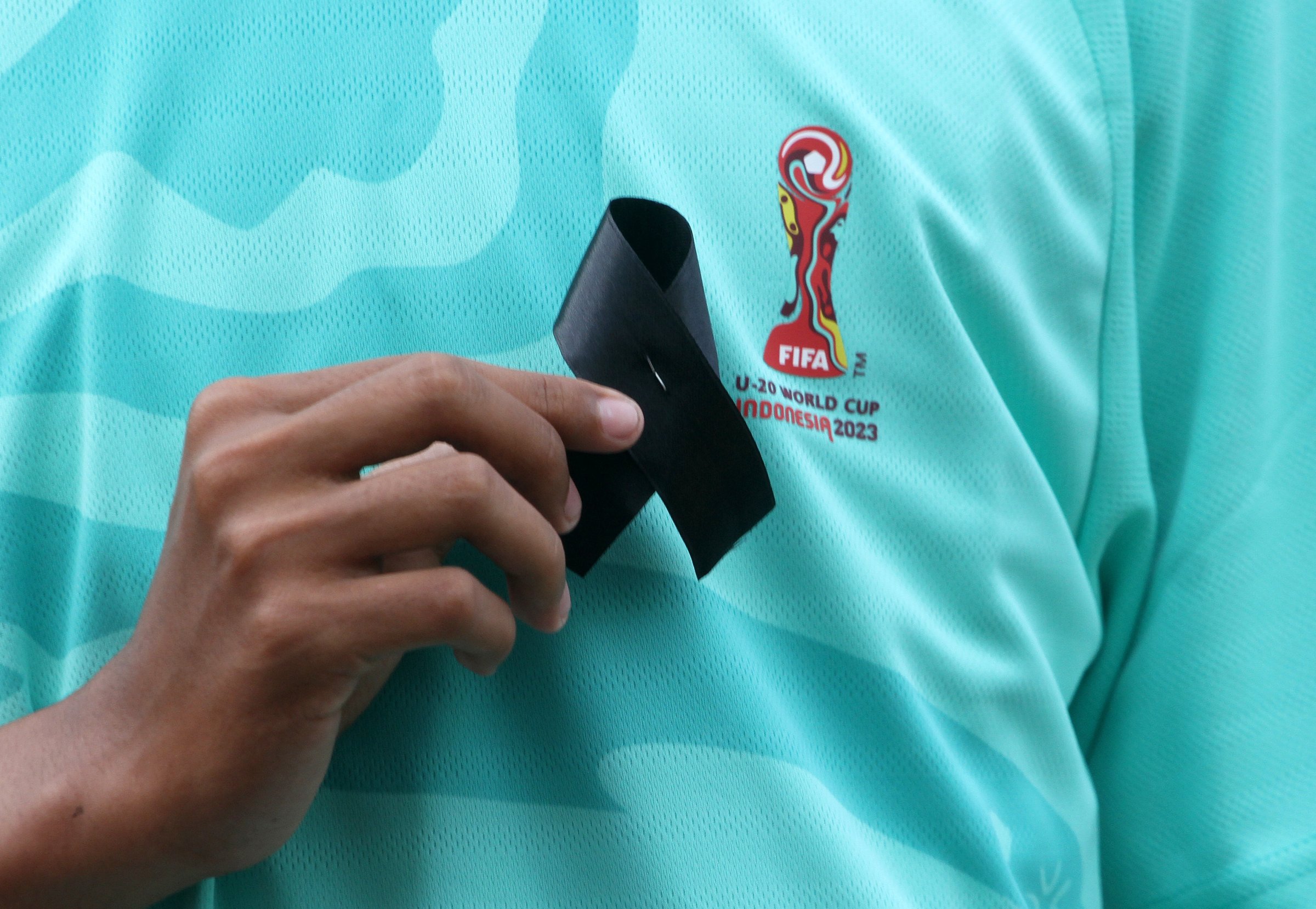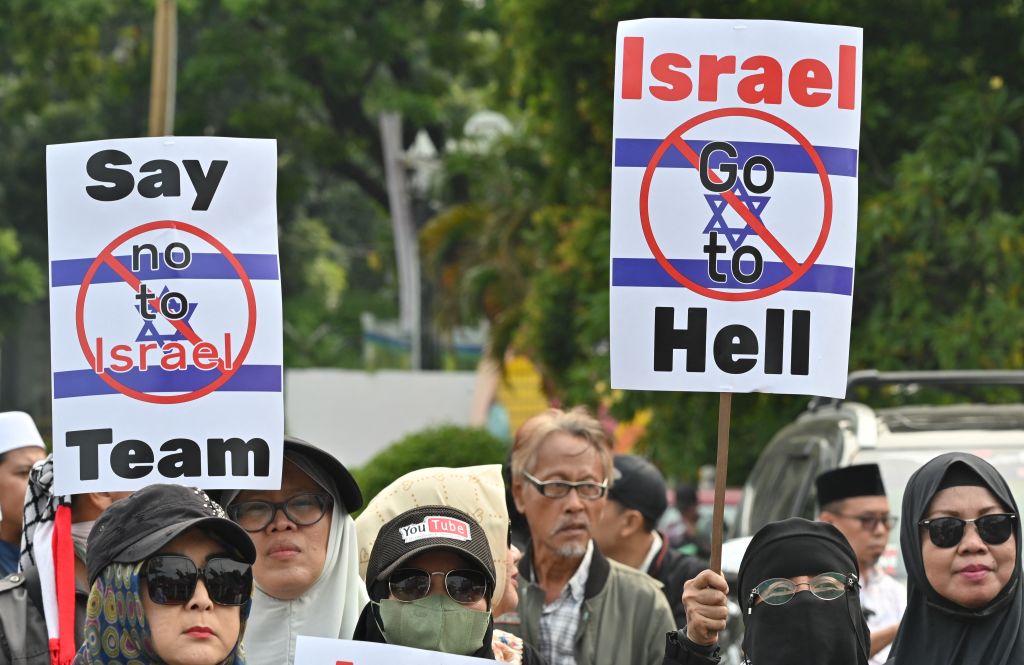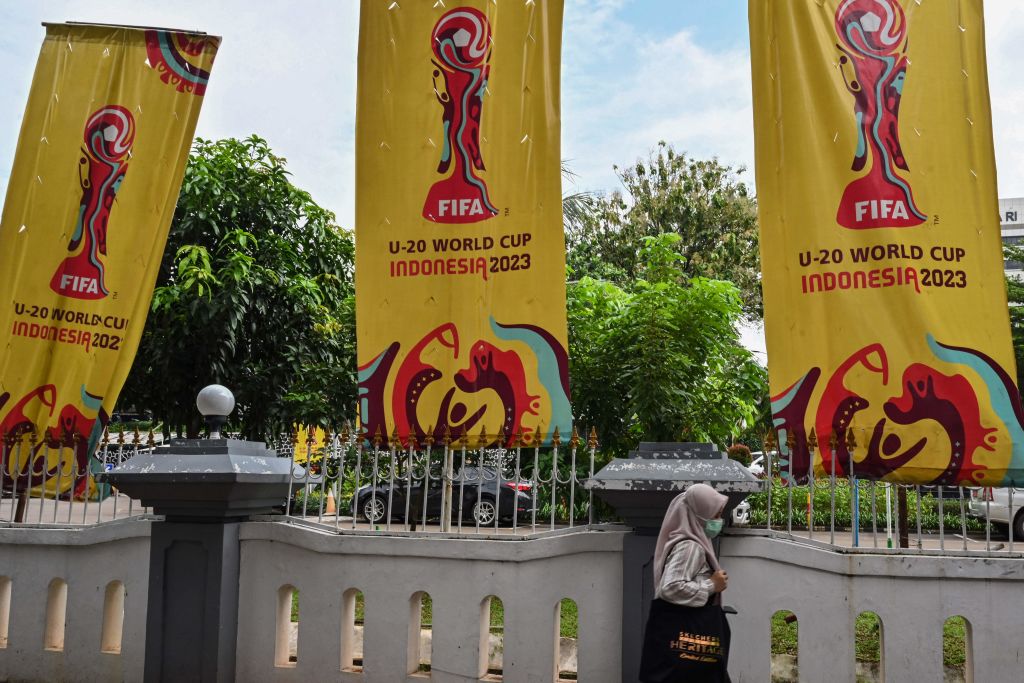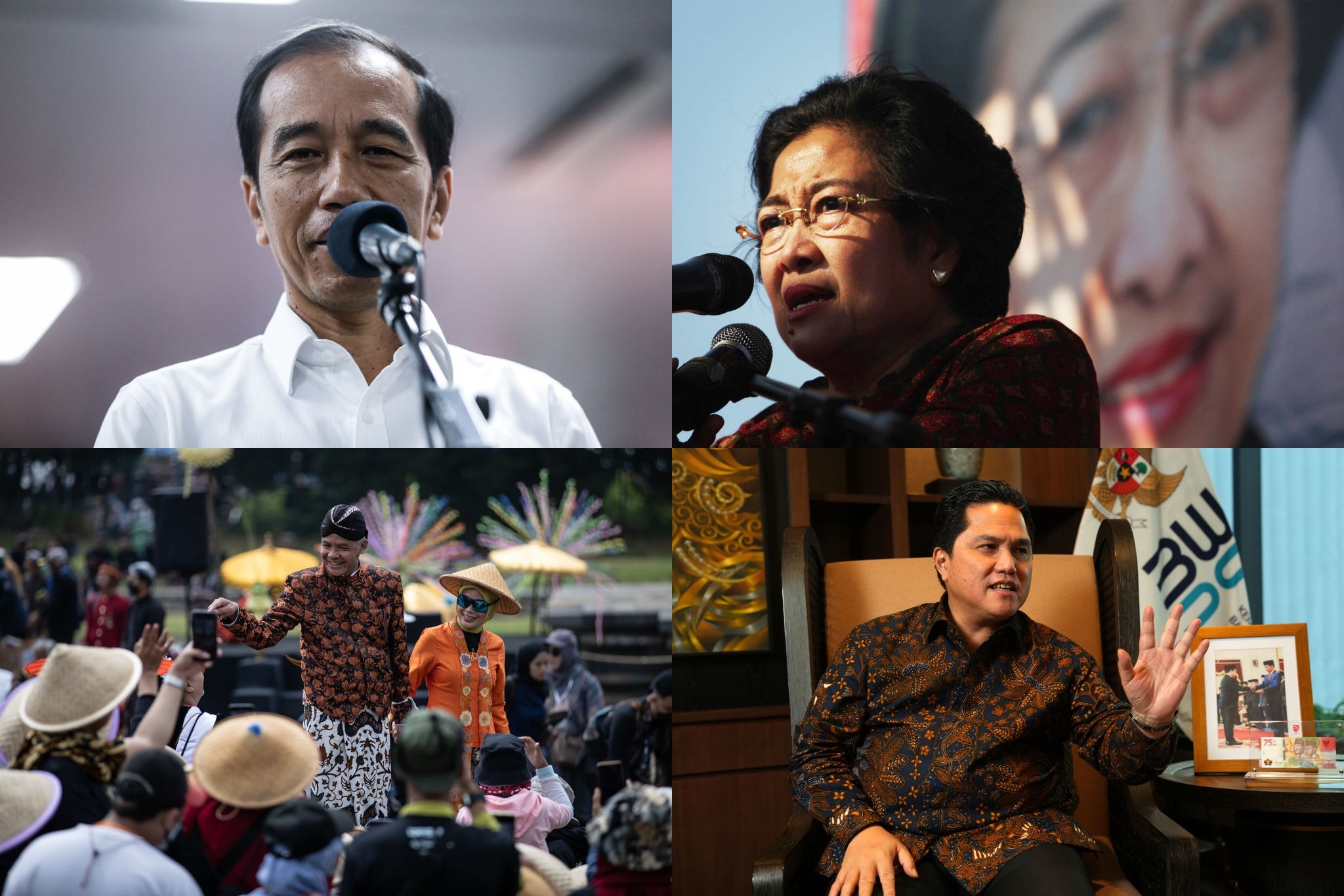
Staging the FIFA Under-20 World Cup was meant to be a badge of pride for Indonesia. While not known for its soccer prowess—the men’s team is 149th out of 211 in official rankings—the Southeast Asian nation of 277 million people is renowned for its passion for the sport: 78% of Indonesians consider themselves soccer fans, compared to 46% in the U.K. or just 32% in the U.S.
But the tournament, which was set to kickoff in May, was abruptly pulled from Indonesia last week—costing the country billions of dollars, shattering the dreams of its young would-be representatives on the pitch (as their team only qualified to play as the host), and leaving millions of fans bitter and angry at the politicians believed to be responsible for the muck up.
Why did FIFA remove Indonesia as host?
FIFA said it stripped Indonesia of its hosting duty “due to the current circumstances.” The decision from soccer’s ultimate governing body came amid growing uncertainty over whether the team from Israel would be able to compete in Indonesia without disruption.
Over the last several weeks, there had been a series of pronouncements by local officials and even some small street protests calling for the Israel team to be banned, despite its performance-based qualification for the tournament. The Indonesian government had anticipated tensions rising over Israel’s participation, but it had tried to strike a balance by insisting that it would welcome and guarantee the safety of all the teams invited, including Israel, while also maintaining that its commitment to Palestine was unwavering. “We cannot mix up sports and politics,” President Joko Widodo, commonly known as Jokowi, said in a statement in late March, as the controversy unfolded.
Indonesia—which has the largest Muslim population in the world—does not have formal diplomatic ties with and is often critical of Israel, while it has long been a vocal supporter of Palestinian independence. It’s not the first time the Southeast Asian country has had issues with Israel in sports events either. In 1958, Indonesia joined Turkey and Sudan in dropping out of the World Cup qualifiers to avoid playing against Israel, and during the 1962 Asian Games—under Indonesia’s founding president Sukarno—the Indonesian government refused to issue visas to Israeli participants, forcing Israel to eventually withdraw. As recently as 2006, Indonesia pulled out of the Fed Cup tennis tournament because it was held in Tel Aviv. But recently, relations had somewhat eased: in 2015, an Israeli badminton player played in the World Championships in Jakarta, just last year an Israeli rock climber competed in Jakarta, and in February an Israeli cyclist raced in the UCI Track Nations Cup.

As calls to keep Israel out of this summer’s soccer tournament grew, the Football Association of Indonesia (PSSI) tried to resolve the issue with FIFA. But FIFA had made up its mind, saying in a statement on March 29 that a new host would be announced as soon as possible. FIFA noted that it would continue to work with PSSI on an ongoing project to “transform” the sport domestically, but as an additional sanction over the whole debacle, FIFA froze development funds allocated for the PSSI until it finishes reviewing Indonesia’s plans for improving soccer in the country.
Indonesian soccer has long been hounded by issues of corruption and violent fanaticism. In 2015, FIFA suspended the Indonesian soccer association for a year, temporarily precluding its national team from taking part in international competition, over government interference in the domestic league. And last October, more than 130 people died in a stadium crush, prompting investigations into police failures and a series of charges and convictions against organizers and authorities deemed at fault for the disaster. Nonetheless, Indonesia still hopes to co-host the 2034 World Cup.
What is the economic impact of losing the tournament?
FIFA’s decision upended Indonesia’s years of preparation since its bid to host the tournament was chosen over Brazil and Peru back in 2019. (It was originally meant to be played in 2021 but delayed due to COVID-19). Dex Glenniza, an Indonesian soccer analyst, tells TIME that the overall cost to the country is “very detrimental,” both from investments that will now not be taken fully advantage of as well as from the loss of expected earnings across a variety of sectors.
The former Minister of Youth and Sports revealed last year that event preparations required a 500-billion-rupiah ($33.45-million) budget. And that doesn’t even include the cost of venue renovations, says Glenniza. Data from the Ministry of Public Works, Voice of Indonesia reports, show that an additional 322 billion rupiah ($21.5 million) in public funds had been spent to refurbish stadiums and other pitches for practice sessions.
The U-20 World Cup was scheduled to run from May 20 to June 11, and a study from the Institute for Economic and Social Research at Universitas Indonesia (LPEM UI) estimates that more than 44,000 jobs would have been created. Indonesian paper Kompas also reports that MSMEs (micro, small, and medium enterprises), such as merchandise and food and beverage vendors, were “conservatively” estimated to collectively make 1 billion rupiah ($67,000) a day during the 22-day event. Tourism and Creative Economy Minister Sandiaga Uno also suggested revenue lost from the two million spectators the country expected to welcome across six stadiums would amount to 3.7 trillion rupiah ($248 million).

Overall, without the games, Indonesia will miss out on billions in economic growth: the LPEM UI study projects that the economic added value to its GDP that the country stands to lose is around 3.18 trillion rupiah ($212.36 billion).
Who was involved and how might it affect their future?
Hosting the U-20 World Cup would have been a boon for Jokowi. The 61-year-old populist is termed out from running for president again in the country’s upcoming elections next year, but he is seen as keen to cement his legacy in Southeast Asia’s most populous country. A key part of this has been boosting Indonesia’s role and reputation on the global stage, from hosting the G-20 summit in Bali last year to chairing the annual summit of ASEAN (Association of Southeast Asian Nations) this year. In a presidential broadcast after FIFA’s decision last week, Jokowi said he was “sad and disappointed,” though he also advised that people not seek to point fingers and “blame each other.” On Saturday, he visited the players who will now have to watch the tournament from home to console them.
But it doesn’t help Jokowi’s legacy that it was members of his own party—Indonesian Democratic Party of Struggle (PDI-P)—who were the central figures in the anti-Israel fiasco that cost Indonesia the tournament: Bali’s Governor Wayan Koster and Central Java’s Governor Ganjar Pranowo each issued statements calling for Israel’s removal from the tournament. And the party’s secretary general Hasto Kristiyanto accused FIFA of applying a “double standard” to Israel, allowing the country to compete despite alleged human rights violations when FIFA banned Russia from playing in the 2022 World Cup over its invasion of Ukraine.
More than just Jokowi’s legacy, however, the whole affair could have an impact on who his successor will be, says A’an Suryana, an Indonesian political analyst and visiting fellow at the ISEAS Yusof Ishak Institute in Singapore. Ganjar is considered a frontrunner: electability surveys (taken before FIFA’s decision) show him enjoying a comfortable lead, with defense minister Prabowo Subianto and former Jakarta Governor Anies Baswedan trailing behind.
“Ganjar Pranowo understood that in the event that he released a statement against the planned arrival of the Israeli team, first, he is going against Joko Widodo,” A’an tells TIME. But his decision to do so, says James Dorsey, a visiting senior fellow at the S. Rajaratnam School of International Studies in Singapore, could be reflective of messy “internal politics” within the party.
“He was caring about his electability,” says A’an.
Indonesian magazine Tempo reported that PDI-P chairperson, Megawati Sukarnoputri—the daughter of Sukarno and widely believed to remain influential despite no longer being in public office—had quietly ordered party members, including Ganjar and Koster, to reject the Israeli soccer team’s participation in the U-20 tournament.

It’s unclear what effect the ultimate loss of the tournament could have on any particular figure going forward. Dorsey hedged when asked to forecast the weight that it may bear on Indonesia’s electorate, which is scheduled to vote for new leaders in February 2024 and appears to prioritize more core concerns like infrastructure and inflation. “I don’t know that this [losing the U-20 World Cup] is going to be a big issue a month from now, let alone eight or nine months,” Dorsey tells TIME. “There’s much bigger fish to fry.”
But if the inundation of comments on Ganjar’s social media posts are any indication, his popularity has already begun to take a hit. Indonesian public sentiment towards Israel is not exactly warm—a 2017 GlobeScan poll for the BBC World Service showed only 9% of the country views Israel positively. In recent years, the Palestinian cause has become more entwined with Indonesia’s identity politics, as the public increasingly cleaves between hard-liner Muslims and more moderate followers of Islam.
In the case of the U-20 World Cup, however, it appears the public was willing to let go of identity politics for the sake of sport: a national phone survey conducted in March found that a majority of Indonesians wanted the country to host the tournament even with Israel’s participation. (Ironically, those who were most open to Israel playing on their soil were PDI-P voters, suggesting Ganjar may have spurned his own base).
Ganjar is not the only one whose political future might be impacted though. Erick Thohir, the minister of state-owned enterprises and recently-appointed PSSI chairperson, has reportedly been eyeing the vice presidency in 2024. Thohir, who was the point-person for dealings with FIFA throughout the whole hosting fracas over the last month, told Indonesian reporters last week that he will “work hard” to renegotiate the penalties and avoid severe additional sanctions that may further dent the economy. Thohir, a business magnate who has formerly owned soccer teams Inter Milan and D.C. United, trails behind West Java Governor Ridwan Kamil and Sandiaga Uno, the tourism minister, in pre-election vice presidential surveys, but he had steadily gained prominence in the lead-up to the U-20 tournament.
The event surely would have boosted Thohir’s electability, says A’an. Considering that no party has yet set sights on taking Thohir in for the upcoming polls, A’an thinks that Thohir might be the most doomed by the FIFA fallout, saying that the chairperson “has no other avenue or stepping stone.”
More Must-Reads From TIME
- The 100 Most Influential People of 2024
- Coco Gauff Is Playing for Herself Now
- Scenes From Pro-Palestinian Encampments Across U.S. Universities
- 6 Compliments That Land Every Time
- If You're Dating Right Now , You're Brave: Column
- The AI That Could Heal a Divided Internet
- Fallout Is a Brilliant Model for the Future of Video Game Adaptations
- Want Weekly Recs on What to Watch, Read, and More? Sign Up for Worth Your Time
Contact us at letters@time.com